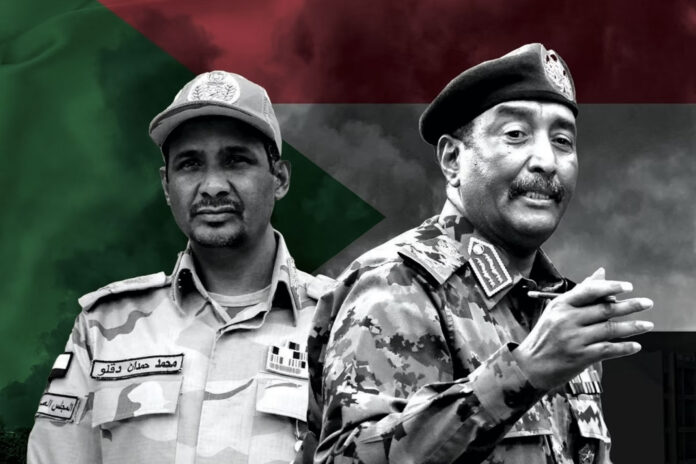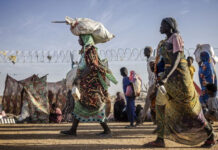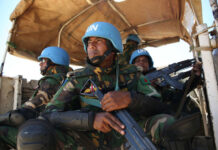Sudan’s army leader, General Abdel Fattah al-Burhan has said the military will not join talks next month in Switzerland aimed at ending more than a year of fighting with the paramilitary Rapid Support Forces (RSF).
Al-Burhan made the statement on Wednesday, shortly after the military said he survived a drone strike on a military graduation at the Gibeit army base in eastern Sudan that killed at least five people.
“We will not retreat, we will not surrender and we will not negotiate,” al-Burhan told troops.
“We are not scared of drones,” he said at the Gibeit base, which is about 100km (62 miles) southwest of Port Sudan, where the army-aligned government fled after war broke out with the RSF in April last year. The fighting has created the world’s largest displacement crisis and killed at least 15,500 people, according to United Nations estimates.
Video of the drone attack, showed soldiers marching in a graduation ceremony before a whirring sound can be heard. There is then an explosion.
Footage shared by the military that it said was filmed in Gibeit after the attack shows al-Burhan being mobbed by cheering civilians, chanting, “One army, one people.”
There was no immediate claim of responsibility for the attack, but the RSF has denied that the paramilitary force, which controls large swaths of the country, was responsible.
On Wednesday, RSF legal adviser Mohamed al-Mukhtar said the attack was the “result of internal disagreements between Islamists”.
Rejection of talks
Al-Burhan’s rejection of the Switzerland talks comes days after RSF leader Mohamed Hamdan “Hemedti” Dagalo said the group would participate in the negotiations, which were set to be co-hosted by the United States and Saudi Arabia on August 14.
The UN, African Union and Egypt were set to be observers. The United Arab Emirates, which has denied accusations it is providing weapons to the RSF, was also to attend.
Sudan’s Ministry of Foreign Affairs had said on Tuesday that it conditionally accepted the invitation to the talks but only if they were proceeded by “full withdrawal and an end to expansion” by the RSF.
Al-Burhan and Hemedti briefly shared power after the 2021 overthrow of a transitional council put in place following the toppling of President Omar al-Bashir in a popular uprising two years earlier.
But a continuous power struggle between the two men, fuelled by plans to integrate their two forces, exploded into war in April 2023 with fighting first breaking out in the capital, Khartoum. The RSF has since taken control of most of the Darfur region and Gezira state.
The paramilitary force has also recently launched an offensive in Sennar state in southeastern Sudan and has been besieging el-Fasher, the capital of North Darfur state, cutting off residents from food and supplies.
Both sides have accused the other of war crimes, including deliberately targeting civilians, indiscriminately shelling residential areas and blocking humanitarian aid. In a report on Tuesday, Human Rights Watch said both sides have committed widespread sexual and gender-based violence in Khartoum.
Meanwhile, the International Organization for Migration said in June that nearly 10 million people in Sudan have been displaced due to the fighting, which has pushed half the population into hunger.
The two sides last held direct talks in Saudi Arabia last year. Those talks ended in temporary truces that were quickly violated.
Other mediation attempts have failed to bring both parties directly to the negotiating table although UN Secretary-General Antonio Guterres’s personal envoy for Sudan, Ramtane Lamamra, held talks with delegations from both sides in Geneva this month.
(With Agency Inputs)










